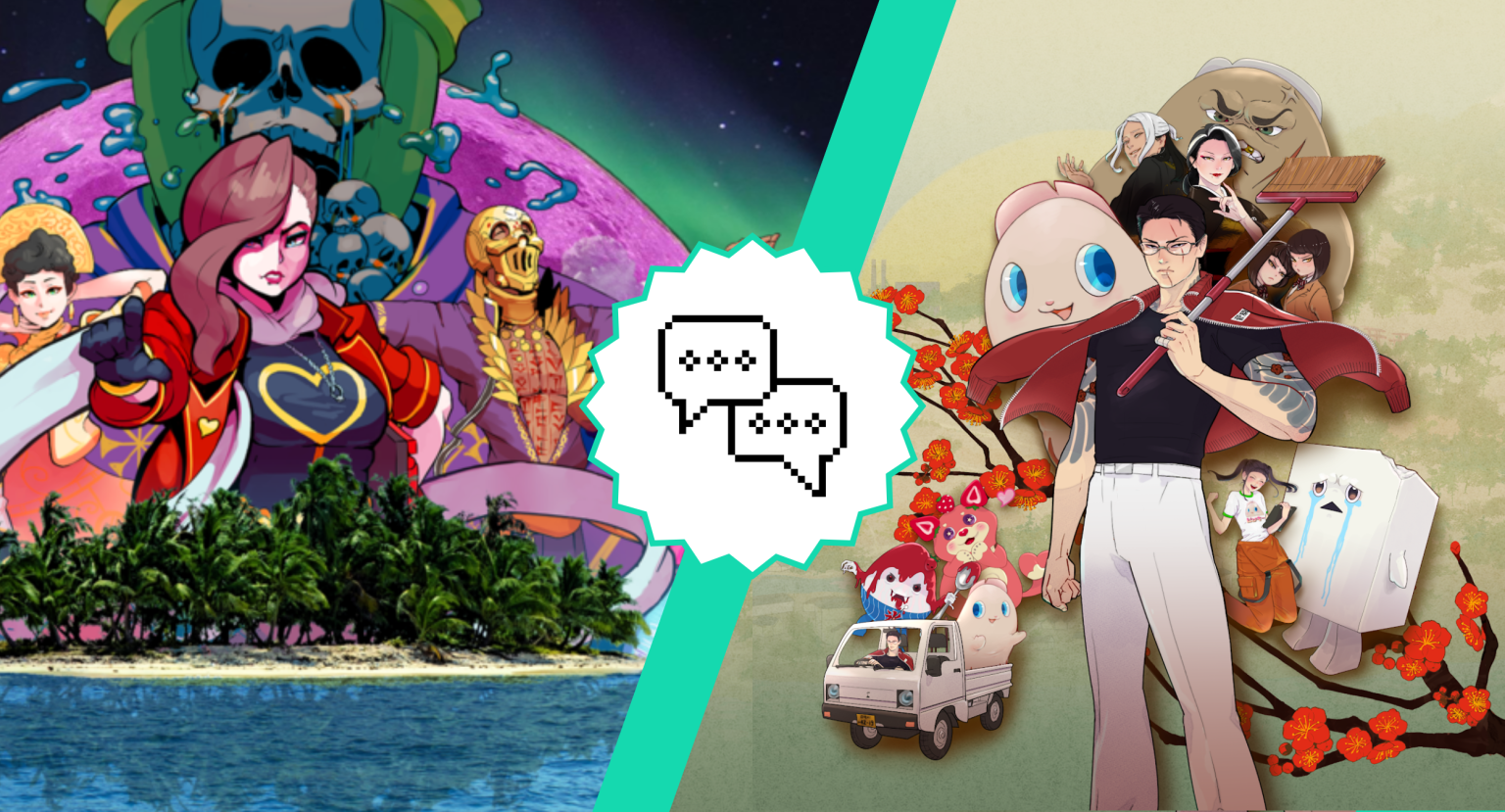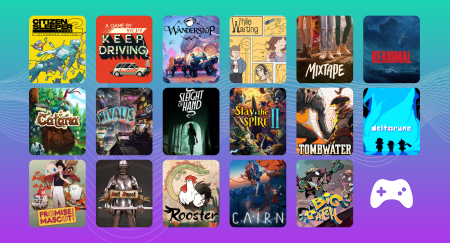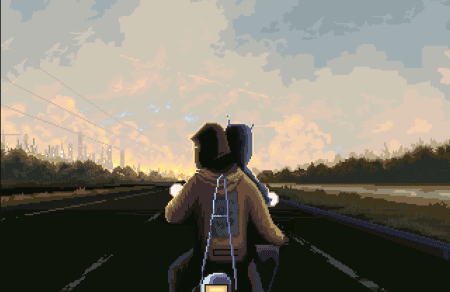Sometimes, you see a combination of words whose connections are so absurd that they inspire you. When I heard that UK-based Kaizen Game Works’ second title would be an “Open World Mascot Management Yakuza Crime Drama,” I knew I had to find out everything I could about how it came to be.
I loved Kaizen’s Paradise Killer (2020), a sexy murder mystery in the afterlife (another great combination of words). It was an excellent surrealist crime adventure, made all the more impressive by the fact that it was the debut title from a small indie studio. Paradise Killer did something incredibly unique in the mystery genre—in the final moments, players could accuse anyone and make their case for it. But to earn an ending like that, the game had to tell a well-written story with strong characters and sharp dialogue.
I asked the Kaizen team to share about their creative process on Paradise Killer and their upcoming sophomore game, Promise Mascot Agency.
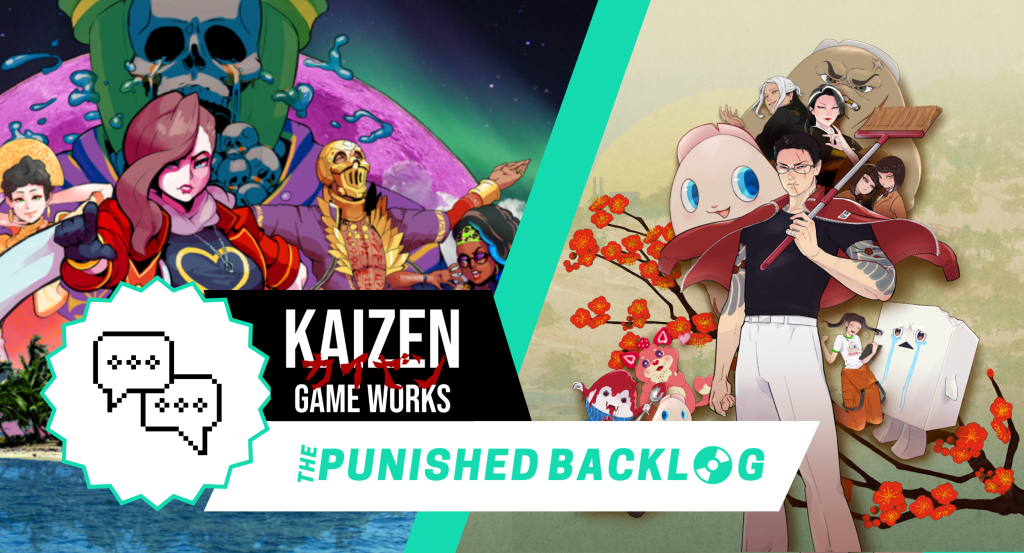
Amanda Tien, Editor at The Punished Backlog (AT): The settings of the upcoming Promise Mascot Agency, an open-world mascot management crime drama set in a mysterious Japanese town, and Paradise Killer, a sexy absurdist murder mystery in an afterlife, are unique environments. Both games have a distinct visual aesthetic, which I’m sure is in no small part to decisions by your Art Director, Rachel Noy. What was important to you in building the world?
Oli Clarke Smith, Co-Founder of Kaizen Game Works & Game Director: For Paradise Killer, we chose a fantasy world so that we weren’t bound by real world rules or expectations. That allowed us a great deal of freedom with the mystery but put a huge burden on the world-building to support it. Every facet of Paradise Killer’s mystery had to be backed up with a grounding in our bizarre world, so we had to develop some very complex details to anchor everything. This allowed us to weave in very small bits of lore to the mystery so we could blur the lines between main story and side story.
AT: So, on the one hand, a fantasy setting in Paradise Killer gave you a lot of freedom but also required a lot of scaffolding to make that freedom plausible. How did having a more realistic setting for Promise Mascot Agency shape the game?
Phil Crabtree, Co-Founder of Kaizen Game Works & Technical Director (PC): It has been more of a challenge. In Paradise Killer, we could really shape the world to fit the needs of the story, but in Promise Mascot Agency, we wanted it to feel like you’re exploring a rural community in Japan.
There are still a lot of fantasy elements. We have the mascots (which are real beings, not people in suits) and not everything in Kaso-Machi is as it seems, but it is still a place that people could recognize as “real.” Fortunately, we have had the opportunity to work with people from Japan and the region where the game is set who have really helped us make sure that we get that feeling right, but it has definitely been a longer process.
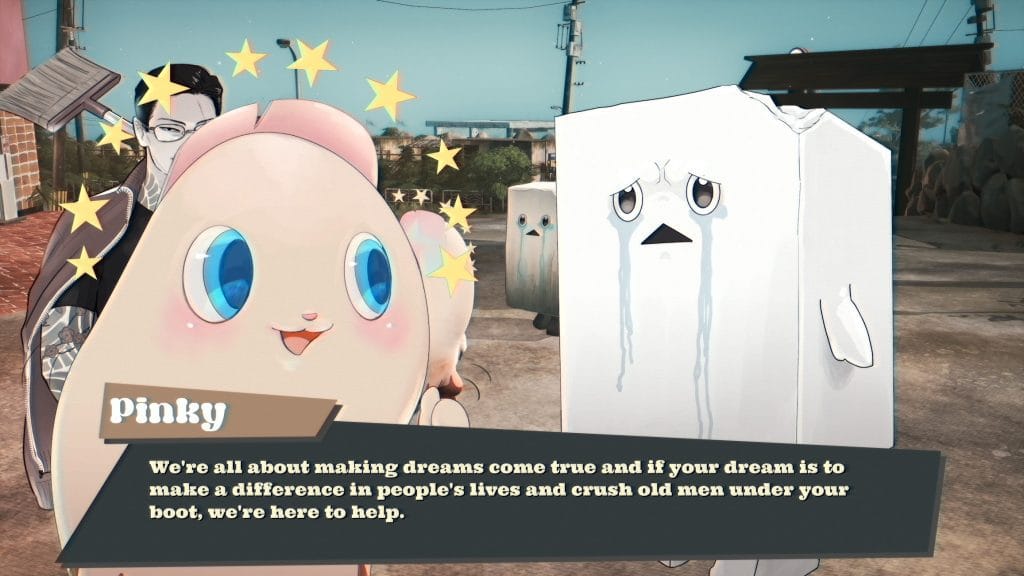
Promise Mascot Agency is a different kind of game to Paradise Killer, but it has the same heart to it.
Phil Crabtree, Co-Founder of Kaizen Game Works & Technical Director (PC)
AT: I remember in an old version of your game design philosophy, you described “story-interacting” versus “storytelling,” talking about the freedom for players to go where they want to and when, and to choose how they engage with the story. I felt I saw this philosophy in action with the ending of Paradise Killer where players could accuse anyone in the final moments of the mystery. How does the approach empower the development process?
OCS: The “story interacting” approach can seem very scary when first tackling it. I have worked on AAA narrative games in the past and the level of freedom we give players in Paradise Killer would be impossible in a AAA situation because of the fidelity requirements. If you needed performance capture animation for the face and body for a game with as much freedom as ours, the mocap budget would be insane. Similarly, the development would be a nightmare because of the last minute changes you need to make. We did extensive rewrites to fix plot holes or bugs two weeks before we shipped Paradise, and there’s no way you can do that when you need to voice act and mocap everything.
So, our approach empowered us in some ways because it meant that instead of trying to live up to a certain level of production values, we needed to double down on our lo-fi approach. That meant no 3D characters, no photo real environments, and more stylish art, more dialogue.
AT: Conversely, how does that game design ethos challenge the process?
OCS: The challenge comes from making sure everything fits together. For the Paradise development, it was all in my head—no design docs because things changed so rapidly. I’d write something and a few days later, find something that contradicted it in another dialogue file (in Paradise Killer, we ended up with about 550 dialogue files and Lord knows how many lore collectables) and then have to quickly make a fix. And that fix could potentially cause ripples elsewhere.
Once you give yourself into a systems- and agency-first approach to design and eschew realistic production values, you can just have a lot of fun. Game development is more fun when there ain’t no one breathing down your neck to script lock for motion capture.
AT: Ha! Yeah, I loved the characters in Paradise Killer. They were meticulously designed—from the 2D art (no mocap necessary!), to the dialogue, to their interactions which felt unique and true to them. From the trailers, it looks like you’ll be continuing that with Promise Mascot Agency. What do you think makes a character feel whole/real/tangible in a video game?
OCS: I think that game characters that try to imitate prestige TV characters don’t feel real to me because one second they’re having an emotional conversation, and the next second you get a trophy for getting 10 headshots. The key to a great game character is an outsized personality, a distinctive way of talking, and a very clear motive for being there. After that, you can slip in the secondary personality traits and quirks that give them depth.
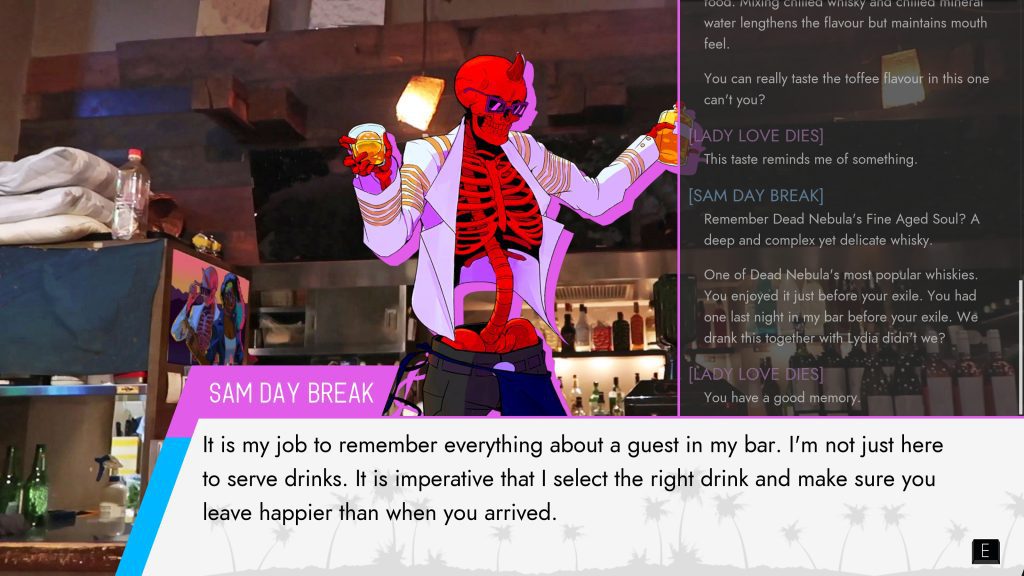
For example, I think of the King of All Cosmos character in the Katamari games. He has a hugely outsized personality, a wonderfully distinctive voice and a clear motive. The gameplay serves his motive and narrative (absentee father who needs you to clear up his mess) and the conversations you have with him show other sides to him—his yearning and his sadness. Characters also don’t need to be as exaggerated as the King. In comparison, the mystery in the first Resident Evil game succeeds with very little dialogue and characters with knife-edge sharp motives.
Another thing that makes characters feel less tangible is a ham-fisted way of writing exposition or the writer’s feelings. Phrases like “As you know,” and “I don’t need to tell you that” clearly mark the characters as being nothing but narrative explainers.
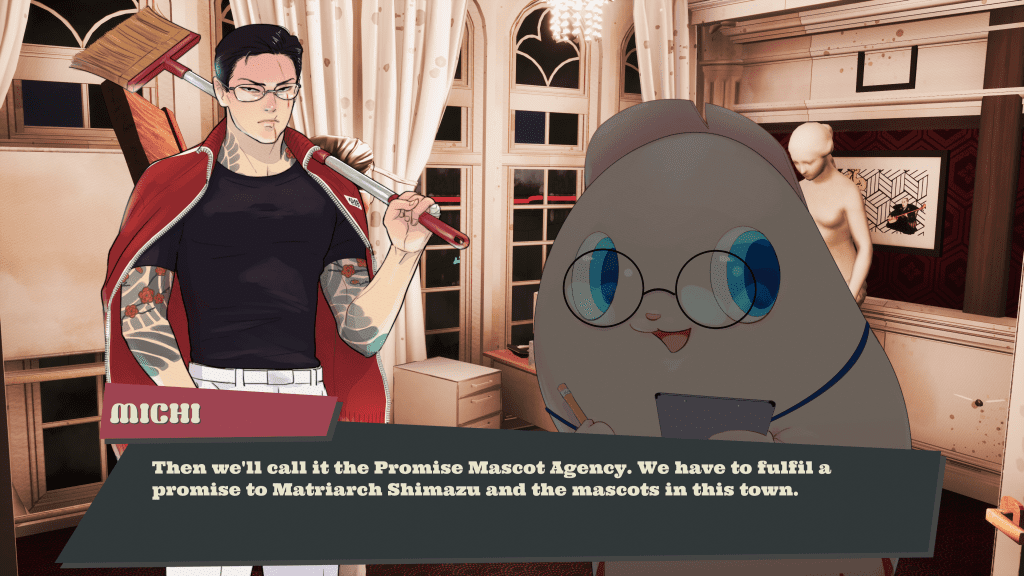
AT: Totally—the difference between a character being their own being with their own motivations versus being simply a plot device or the writer’s billboard.
OCS: Yes. Some writers clearly have something they want to say and sometimes this leads to over writing or it leads to characters trying to be too clever. This pulls the audience out because they take notice of the writer and the character feels less real.
AT: There are intriguing characters in your next game, too. Promise Mascot Agency seems like it’ll be a very different kind of game than Paradise Killer. There’s still crime, character-driven dialogue, and humor, but from the trailers, it looks like there’s a lot more movement, more action. What did you want to try this time around?
PC: Promise Mascot Agency is a different kind of game to Paradise Killer, but it has the same heart to it. Exploration of the world is important in both games, but the way you do it is very different. Paradise Killer was all on foot, with some movement upgrades and requiring a little bit of parkour skill. In Promise Mascot Agency, you’re traversing the world in a kei-truck (a specific kind of Japanese mini truck) . There are upgrades to find which will change your movement and exploration options, but it is (mostly) more grounded. Where Paradise Killer rewarded precision, Promise Mascot Agency rewards control of drifting, finding shortcuts, and sometimes just brute force.
Once you give yourself into a systems- and agency-first approach to design and eschew realistic production values, you can just have a lot of fun.
Oli Clarke Smith, Co-Founder of Kaizen Game Works & Game Director
Harry Denholm, our incredible programmer, spent a lot of time battling with physics to try and get that feeling right. We wanted it to feel old, and like it was struggling to get up a hill, but it couldn’t be frustrating slow. It needed to feel both a bit clunky, and nimble at the same time, while still having personality. We wanted you to launch yourself off a cliff, but make sure that the landing was controlled. I’m really happy with where we’ve got to on it, but I think the amount of iteration to get that right was a bit of a surprise to all of us.
The idea of traversing the world in a kei-truck was pretty much front-and-center in our development process. We all love them, and something about navigating through towns, or up steep rural hills as the sun is setting sounded really appealing. We also knew that we wanted to get it feeling like an old kei-truck, and whilst that sounds easy, it is something that has taken a lot of iteration.
AT: It reminds me of the Mako from the first Mass Effect, but designed more intentionally for a modern player and I’m so excited to see what that drives like. In developing this second title, what were some of the biggest surprises of the process?
PC: Some of the biggest surprises we had whilst making Promise Mascot Agency were the opportunities that became available to us, things we could never imagine whilst making Paradise Killer. Even from the first month of development we had incredible opportunities, like our funding partner (Kowloon Nights) approaching us with an offer of working with the amazing Ikumi Nakamura!
Later on, when we were looking for voice actors we were continually blown away by the people who agreed to work on the game. Never did we imagine we’d have Takaya Kuroda, Shuhei Yoshida, or SWERY as part of the cast! We like to put a lot of trust in the people we work with; we let them bring their own personality to the role, and everyone has done an incredible job.
AT: That’s all so amazing! I’ve been fangirling over Ikumi Nakamura ever since that incredible E3 2019 presentation she gave for Ghostwire: Tokyo. Her enthusiasm for game design was palpable!
Those voice actors are really exciting—you shared such a fun cast announcement trailer last month. That video is part of a larger promotion for Promise Mascot Agency; for example, you posted a couple great videos from MCM Comic Con on your Instagram, one of which I’ll include below.
While I could easily keep asking you questions, I’ll stop because I know you’ve got a lot of work to do! Good luck with the home stretch of development on Promise Mascot Agency!
This interview has been edited and condensed for clarity.
Promise Mascot Agency by Kaizen Game Works is expected to release on April 10, 2025 on Windows PC, PlayStation 4 & 5, Xbox Series X/S, Xbox One, and Nintendo Switch. Keep an eye on Kaizen’s X account and the game’s Steam page for release news.
Amanda Tien (she/her or they) loves video games where she can pet dogs, solve mysteries, punch bad guys, play as a cool lady, and/or have a good cry. She started writing with The Punished Backlog in 2020 and became an Editor in 2022. Amanda also does a lot of the site's graphic designs and podcast editing. Amanda's work has been published in Unwinnable Monthly, Poets.org, Salt Hill Journal, Aster(ix) Journal, and more. She holds an MFA in Fiction from the University of Pittsburgh. Learn more about her writing, visual art, graphic design, and marketing work at www.amandatien.com.


